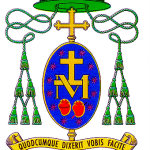Description
Kumba Diocese Created on the 15/03/2016 by His Holiness Pope Francis and Mgr Agapitus Enuyenyoh Nfon appointed on the same day as pioneer Bishop, was carved out of the mother diocese of Buea –created on May 18/1950
The Bishop elect was received in Kumba by a marmot crowd of close to five hundred thousand Christians and non-Christians triumphantly on April 25th 2016 and installed on 7th may 2016 by his Grace Arch Bishop Pierro Pioppo the Nuncio to Cameroon and Equatorial Quinea . Kumba Diocese covers all of Ndian, Meme and part of kupe Muanenguba Divisions –South West Region of Cameroon
In 2017 his Lordship Bishop AgaPitus Nfon appointed the pioneer pastoral team of three members Rev. Fr. Aloysius Boh ,Mr. Mekuru Martin Elondo and Madam Martha Sone but for health reasons the pioneer director did not take up office, but was flown for treatment abroad, as a result the Bishop ask the Vicar general Rev. Fe.Nkede Everistus to work with the laity council to organize the first Ever Diocesean pastoral week celebration in 2017 and empowered the other members of the team to move on with 2018 programme to implement the Provincial pastoral plan in the parishes etc. 2018 the second pastoral director by name Rev. Fr. Charles Bate was appointed. In year 2020 the team saw the appointment of the third director an old member of the team Mr.Mekuru M.Elondo and Rev.Fr.Tim Francis as chaplain of pastoral work. Presently the Diocesan pastoral formation team is made up of Mr. Mekuru Martin Elondo ,Rev Fr. Tim Francis ,and Madam Martha Sone
The DPFT (has an office at the Diocesan Pastoral Center ground floor. Team members are not yet full time as required by Peccpa due to the fact that the diocese is still young and the tense politician atmosphere that continued to disturb development.
Role of the Diocesan Pastoral Formation Team
The Diocesan Pastoral Formation Team is also known as the COMMISSION FOR CATECHETCAL AND PASTORAL AFFAIRS. A clear indication that while the team is charged with general pastoral affairs the team identifies with the catchecatical commission were they could
steadily study catechesis for use in the field. The pastoral team is responsible to train all pastoral lay agents , put up pastoral councils , commissions, all other agents and follow them up
- The main responsibility of the team is formation at the various levels (cfr. Prov. Past. Plan 106-107).
- To brain storm on how to best implement the provincial pastoral plan ,follow up and evaluate to see the failures and successes of the strategy.
- The formation team at any level is the conscience of the church.
- The team has not got only a formative role but also chairismatic as all her members are abound to grow in holiness so as to accompany others in their own growth.
- They most work in collaboration with the priests ,since priests are also members of the formation team.
- The PFTs are technicians to the Pastoral Councils and must follow up decisions of the pastoral council.
- PFTs evaluate the life of the church at a given level and also makes clear to the Christians community , the place of the prayer and action groups in the implementation of the Prov past plan.
- They have to know the charisms of the different church groups.
- They carry out formative programmes through the media.
- The formation team also ensure that there is a balance between the hierarchical and charismatic structure of the church .
- The team needs to periodically evaluate itself in order to grow. As a charismatic structure it checks on how the parishes are processing with the provincial pastoral plan in the general growth in terms of development, evangelization, conversion , seminaries understanding and the general growth.
The collaboration between the various pastoral agents is governed by the principle of the spirituality of communion etc.
The Diocese of kumba is made up of four deanaries twenty-one parishes and five pastoral Zones . Each of this deanery and parishes have elected pastoral councils, and eighteen commissions from the small Christian communities to the deanery level but for a few pastoral zones.
Almost all parishes have pastoral formation Teams that help to direct the proper implementation of the provincial pastoral plan.
Challenges
- Most parishes are almost deserted because of the Anglophone crisis in Cameroon
- These parishes fine it difficult to raise fund to support seminars in teams of transportation and logistics.
- The turn out in most seminars is often very poor as most parishes do not budgets for pastoral work.
- Most Parish priests do not make enough effort to train parishioners.
- Most parishioners erroneously measure their participation in church work following their relationship with the priests.




